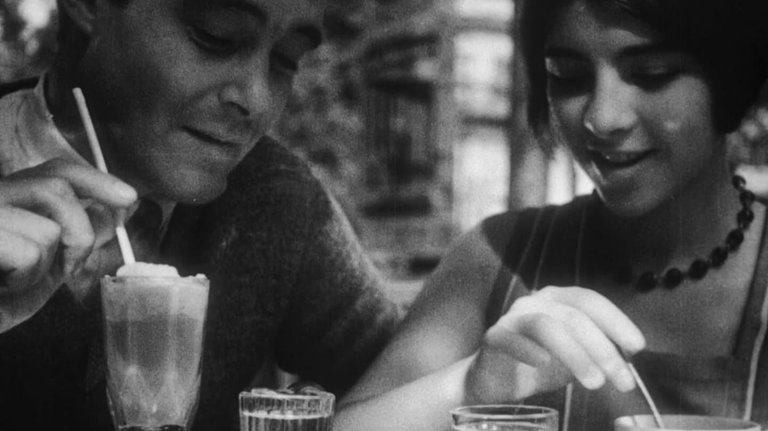Film Review: People on Sunday (Menschen am Sonntag, 1930)

Few films encapsulate the phrase "end of an era" as thoroughly as People on Sunday, a 1930 German silent drama that does so in more ways than one. The film, directed by Robert Siodmak and Edgar R. Ullmer, with screenplay by Siodmak's brother Curt and Billy Wilder, is a slice-of-life drama that follows a group of young people as they spend a day off in Berlin.
The plot begins on Saturday when wine seller Wolf (played by Wolfgang von Waltherhausen) meets beautiful film extra Christl (played by Christl Ehlers) who got stood up on a date. He offers to meet her tomorrow, and he will be accompanied by his friend Erwin (played by Erwin Splettstößer), a taxi driver. Erwin is supposed to bring his live-in girlfriend Annie (played by Annie Schreyer), a model, on a double date. But, following a fight, she simply sleeps and frustrated Erwin decides to go along. Thankfully, Christl has brought her best friend Brigitte (played by Brigitte Borchert), gramophone records shop clerk, who would accompany them as they spend idyllic day swimming, sunbathing and having fun at the Nikolassse park.
People on Sunday was described and advertised as “experimental”. While they may have been true in the early 1930s, when the documentary was still evolving as a genre and there wasn’t that much different between it and “slice-of-life” dramas, modern audiences would easily recognise the film as not much different than George Lucas' American Graffiti. The film's simplicity, which centers around a group of friends spending a day together, is a timeless concept that transcends the silent era.
The film's production team, while unknown at the time, would go on to have impressive careers in Hollywood, including directors Siodmak and Ullmer and screenwriters Curt Siodmak and Billy Wilder. However, it was their early collaboration with cinematographer Eugen Schüfftan that truly set People on Sunday apart. Schüfftan, who had already made a name for himself with his work on Metropolis, brought a level of technical expertise to the film that elevated it above other silent films of the era. Despite the lack of sound, the film looks like it could have been made today, thanks to Schüfftan's incredible cinematography.
One of the most experimental techniques used in People on Sunday was the casting of non-actors. The cast members played characters based on themselves, and when not shooting, they worked their regular day jobs exactly as those portrayed in the film. Despite the great film acting talent displayed, none of them had meaningful careers afterwards. Erwin Splettstößer, who played the taxi driver, tragically died three years after the film when his own taxi ran him over.
Despite being "experimental" and touted as representative of the New Objectivity movement, People on Sunday became quite popular among the audience and became one of the last silent films to become a box office hit in the history of Weimar cinema. The film's popularity has only grown in the decades since, as it provides a fascinating glimpse into the long-lost world of Weimar Germany and its capital Berlin. Shot in the summer of 1929, it portrayed the moment in time when its citizens appeared to be most prosperous, most relaxed about the future, and generally happy.
It also showed a world in which young people enjoyed rather relaxed mores of sexual morality, which included one character having a live-in girlfriend, two friends switching girlfriends in the middle of a double date, and shamelessly flirting with other women. Only a few months after the shooting of the film, this world would begin to unravel with the Wall Street Crash, leading to years of economic crisis, world war, and decades-long division of the city. In recent years, People on Sunday has been used as a reference point by the authors of the 2017 period television drama Babylon Berlin, set in exactly the same time period.
Like so many grand silent films, People on Sunday isn’t available in its original form. Due to censorship and being suppressed by Nazi authorities over Jewish background of its authors, some of its pieces had been lost and current version was result of painstaking search over many of the world’s cinema archives. This makes the plot slightly confusing, but it is compensated with short running time that makes it digestible for modern audience, while its visual quality is quite appealing. As a result, People on Sunday is a film that is both a product of its time and timeless, a must-watch for any film lover.
RATING: 7/10 (+++)
Blog in Croatian https://draxblog.com
Blog in English https://draxreview.wordpress.com/
InLeo blog https://inleo.io/@drax.leo
Hiveonboard: https://hiveonboard.com?ref=drax
Rising Star game: https://www.risingstargame.com?referrer=drax
1Inch: https://1inch.exchange/#/r/0x83823d8CCB74F828148258BB4457642124b1328e
BTC donations: 1EWxiMiP6iiG9rger3NuUSd6HByaxQWafG
ETH donations: 0xB305F144323b99e6f8b1d66f5D7DE78B498C32A7
Posted using CineTV